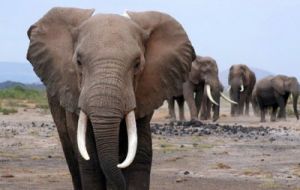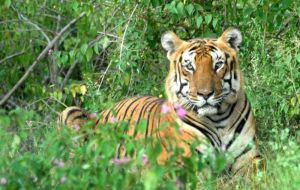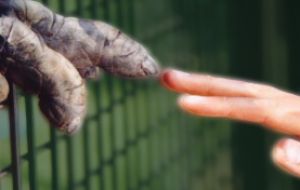MercoPress. South Atlantic News Agency
World Environment Day: UN urges help to end illegal wildlife trade
 Elephants are being slaughtered for their ivory, rhinos for their horns, and pangolins for their scales.
Elephants are being slaughtered for their ivory, rhinos for their horns, and pangolins for their scales.  From sea turtles to tigers to rosewood, thousands of species of wild animals and plants are being driven ever closer to extinction.
From sea turtles to tigers to rosewood, thousands of species of wild animals and plants are being driven ever closer to extinction.  Great apes have disappeared from Gambia, Burkina Faso, Benin and Togo, and other countries could quickly follow.
Great apes have disappeared from Gambia, Burkina Faso, Benin and Togo, and other countries could quickly follow. Following is UN Secretary-General Ban Ki-moon’s message on World Environment Day, to be observed on 5 June:This year’s observance of World Environment Day shines a much-needed spotlight on the illegal trade in wildlife.
There is grave cause for alarm. Elephants are being slaughtered for their ivory, rhinos for their horns, and pangolins for their scales. From sea turtles to tigers to rosewood, thousands of species of wild animals and plants are being driven ever closer to extinction. The businesses and individuals involved are motivated solely by short-term gain at the expense of long-term benefit to communities and habitats. In many instances, they act in collusion with transnational organized crime networks and groups actively involved in destabilizing nations.
The United Nations and its many partners have resolved to tackle this illicit trade, including by setting clear targets to put an end to poaching in the Sustainable Development Goals, adopted last year by all 193 Member States. Last month, at the second United Nations Environment Assembly in Nairobi, we launched a United Nations “Wild For Life” global campaign, led by the United Nations Environment Programme (UNEP), the United Nations Development Programme (UNDP), the United Nations Office on Drugs and Crime (UNODC) and the Convention on the International Trade in Wild Species of Fauna and Flora (CITES). The campaign asks everyone to pledge to end the illegal trade in wildlife, from ordinary citizens, who can ensure they do not buy prohibited products, to Governments, who can pursue change though implementing effective policies to protect species and ecosystems.
Angola, which is this year’s World Environment Day global host, has served notice that it will no longer tolerate the sale of illegal wildlife products and is strengthening legislation and increasing border controls as part of efforts to restore elephant populations that were devastated by the country’s civil war. Such action sends a strong message that wild species of plants and animals are a precious commodity that must be sustainably managed and protected from illegal trade.
On this World Environment Day, I urge people and Governments everywhere to overcome indifference, combat greed and act to preserve our natural heritage for the benefit of this and future generations.
Wild for Life
The booming illegal trade in wildlife products is eroding Earth’s precious biodiversity, robbing us of our natural heritage and driving whole species to the brink of extinction. The killing and smuggling is also undermining economies and ecosystems, fuelling organized crime, and feeding corruption and insecurity across the globe.
Wildlife crime endangers iconic elephants, rhinos, tigers, gorillas and sea turtles. In 2011, a subspecies of Java rhino went extinct in Vietnam, while the last western black rhinos vanished from Cameroon the same year. Great apes have disappeared from Gambia, Burkina Faso, Benin and Togo, and other countries could quickly follow. Lesser-known victims include helmeted hornbills and pangolins as well as wild orchids and timbers like Rosewood – flowers and timber are also considered wildlife!
Huge efforts to counter the illicit trade - including stronger policies, awareness campaigns and investments in community conservation and law enforcement - have scored some great successes. However, many species remain at risk and it will take a dedicated and sustained effort by each and every one of us to turn the tide.
How can we do it? More people need to understand the damage this illicit business is doing to our environment, livelihoods, communities and security. We must change our habits and behavior so that demand for illegal wildlife products falls. More awareness and action pushes governments and international bodies to introduce and enforce tougher laws and combat those still willing to break them.
This year’s theme for WED – Go Wild for Life – encourages you to celebrate all those species under threat and take action of your own to help safeguard them for future generations. This can be about animals or plants that are threatened within your local area as well as at the national or global level - many local extinctions will eventually add up to a global extinction! Whoever you are, and wherever you live, show zero-tolerance for the illegal trade in wildlife in word and deed, and make a difference.




Top Comments
Disclaimer & comment rules-

-

-

Read all commentsThe United Nations and its many partners have resolved to tackle this illicit trade
Jun 04th, 2016 - 11:43 am 0to little to late,
the biggest danger to all animals and wildlife is humans,
perhaps a culling of a few will help,
Especially the evil ones,
just an opinion.
Greed and short-term gains, as in other fields, drive an all-out offensive on the planet's natural resources such as precious wildlife as well as forests, rivers and lakes.
Jun 04th, 2016 - 02:50 pm 0Time to understand that we are nothing without Nature--we are part of it, not its owners to do as we please.
The real problem lies with the idiots who think the skins of animals make them look attractive to the opposite sex, or the horn of a rhino will help their soft little dicks regain the strength it had when they were young.
Jun 06th, 2016 - 11:47 am 0BUT, and there's always a but, they are not 'visible' in the act of killing, only the poachers are.
The poachers are RELATIVELY easy to deal with, you shoot them when they are caught in the field with the equipment they use for the killing (mainly poison). You then trace the line to the handlers and exporters and you HANG them if they have ANY evidence of the animals in their possession.
I know that the poachers are probably doing the deed to get money for their family but there are plenty of schemes that have been running for years where the villages involved have turned the local wildlife into a show piece for the foreign visitors to enjoy and pay for of course.
Difficult choices but not impossible to achieve, any of it.
Commenting for this story is now closed.
If you have a Facebook account, become a fan and comment on our Facebook Page!